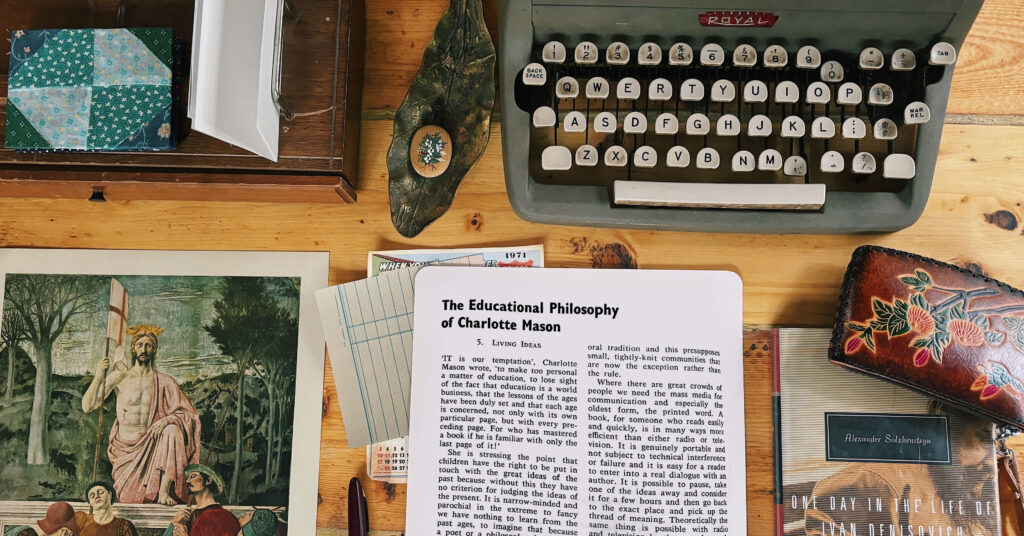The CMP Review — Week of September 2
September 2, 2024

“My ideal is, that from the very beginning of a child’s life, the highest and best of its physical nature should be developed and educated exactly as we educate its mental and spiritual nature, and, as it grows in knowledge and mental culture, so it shall grow in bodily and physical culture, until by this means its life is rounded to a full, perfect, noble womanhood, strong in bodily health and strength, cultured in mind, and refined in thought, and fitted and able to fill a useful part, whether in the home, the school, or some other noble and good profession.” (Rothera, “Physical Culture”, PR19)
@tessakeath
September 3, 2024

In her epochal 1947 paper “The Lost Tools of Learning,” Dorothy Sayers pointed to “three stages of development” which she identified as Grammar, Dialectic, and Rhetoric. But it would take decades for educators to build on Sayers’ ideas. In the meantime, teachers found their basis for stages of learning in the writings of a 20th-century giant of educational thought: Jean Piaget.
Piaget aimed to prove that children, quite frankly, don’t think like adults. If true, then the implications for education are profound. If Sayers and Piaget are right, then children need to be taught according to their stage.
In the early 1970s, Joan Molyneux was the steward of the Charlotte Mason heritage. Pressed on all sides by the increasing momentum of Jean Piaget’s ideology, she saw before her the words of Miss Mason: “We recognise steady, regular growth with no transition stage.”
Was it time to revise Mason’s thought? Was it time to recast Mason’s theory into stages of learning? Was it time to capitulate to the consensus of the age?
Not on Molyneux’s watch. In a long-forgotten issue of the PNEU Journal in 1971, Molyneux took her stand against the leading thinkers of her day. “A dominant idea is not necessarily correct,” she declared. While Piaget has “a respect amounting almost to reverence,” “this should not prevent us from disagreeing with him.”
And then Miss Molyneux fearlessly proceeded to defend the teaching that she had received. Children are born persons. “Children need living ideas from the very first.” Children crave story like we do because they think like we do.
In Molyneux’s courageous and inspiring article, she advised parents to do what she herself did: “Something that a teacher needs to guard against is the temptation to be up-to-date against her better judgement.” Molyneux’s spirited defense of the Charlotte Mason method can help educators even today guard against the temptation to change. But don’t take my word for it. Find out for yourself here.
@artmiddlekauff
September 4, 2024

“Having found the book which has a message for us, let us not be guilty of the folly of saying we have read it. We might as well say we have breakfasted, as if breakfasting on one day should last us for every day! The book that helps us deserves many readings, for assimilation comes by slow degrees.”
—CM, Ourselves
@rbaburina
September 5, 2024
I always thought that “Ourselves” was such a quaint title. As a book intended for young people to learn about how to understand and manage oneself, I could think of more fitting titles. How about “The Nature of a Person” or “Self-Management”? Or “You as a Person”? Or even, “Yourself.”
As I read the book the first time, and then the second and the third, any sense of quaintness dissolved. Here was no little manual about “you.” Here was a guide about how to live a life dedicated to service: animated by the love of God and the love of man.
Only then did I learn the real origin of the title. Charlotte Mason was not merely gathering children around her to talk about “ourselves.” Rather, she was quoting a beautiful prayer from the communion service of her church. A prayer that is not so common these days but may still occasionally be heard.
In a sense, it is a book about self-knowledge and self-direction. But not as an end in itself. The Apostle Paul urged us to offer our bodies as “living sacrifices, holy and pleasing to God.” He said that this is our “spiritual act of worship.” I am so thankful for Miss Mason’s timeless volume. It shows us how to worship in this way.
@artmiddlekauff
September 6, 2024


Well, 15 days after we first saw our monarch chrysalis, it thinned out enough for us to see the orange and black of the wings hidden inside. A bunch of us kept an eye on it throughout the afternoon and well into the evening, hoping to catch a glimpse of its emergence. We watched until after the sun went down. (It was a lovely evening to sit and chat while keeping one eye on the dark chrysalis.)
Google told us that it would probably eclose mid-morning. So a handful of us went to check on it first thing, but at 7:10am, we found our monarch already emerged! It stayed there, drying its wings, for at least an hour, possibly more.
Though we missed the actual moment, we were thrilled our monarch made it!
📷: @angellemeg
@antonella.f.greco
September 7, 2024
“But it is enough for our purpose to prove that the rain need do no harm; for abundant daily exercise in the fresh air is of such vital importance to the children, that really nothing but sickness should keep them within doors. A mere time and distance tramp is sufficiently joyous for a wet day, for, taken good-humouredly, the beating rain itself is exhilarating.” (Vol. 1 p. 88)
@tessakeath
September 8, 2024

In her book The Dialogue, Catherine of Siena offers a message for restless hearts: “Without [God] they could never be satisfied even if they possessed the whole world. For created things are less than the human person. They were made for you, not you for them, and so they can never satisfy you.”
In Psalm 17, David points to what actually can satisfy us: “I shall be satisfied,” he avows, “when I awake, with thy likeness.” But is this peace reserved for the next age, or can we experience it in this?
In Charlotte Mason’s poem “Satisfied,” she shows us how “unquiet heart enters green place of peace where none molest.” There, in the words of Catherine’s Dialogue, “they … feel [God] in their souls by grace and are satisfied.” Read or hear Mason’s poem here.
@artmiddlekauff